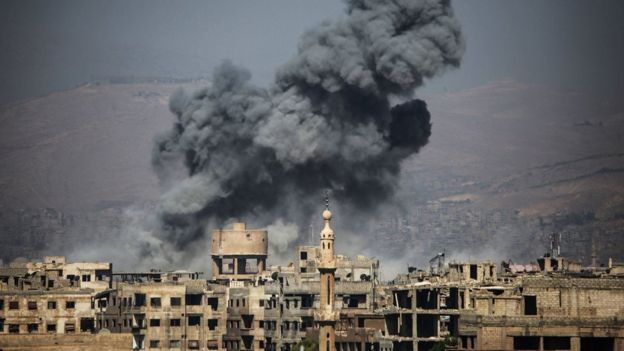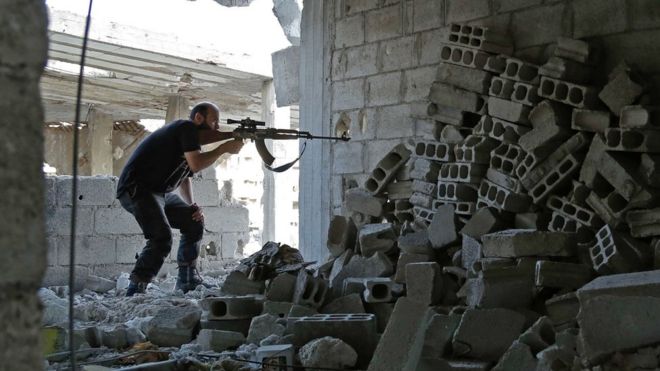The Syrian military
has declared a halt in fighting in parts of the rebel-held Eastern Ghouta
region outside Damascus.
The move came after
Russia, an ally of the government, said it had reached an agreement with
"moderate" rebels to de-escalate conflict in the area.
Analysts warn it is
unclear whether the deal can be enforced.
Eastern Ghouta was one
of four proposed "de-escalation zones" in a deal agreed between
Russia, Iran and Turkey in May.
In a statement, the
Syrian army said a cessation of hostilities in areas of Eastern Ghouta came
into effect on midday local time on Saturday (09:00 GMT).
"The army will
retaliate in a suitable manner to any violation," it said.
Rebel group Faylaq
al-Rahman welcomed the pause and urged the government to respect it.
Monitoring group the
Syrian Observatory for Human Rights reported some isolated shellfire after the
ceasefire took effect but no major fighting.
Earlier on Saturday,
Russia said an agreement with rebels had been signed at talks in the Egyptian
capital, Cairo, on how a safe zone would function in Eastern Ghouta.
It said the deal
defined the boundaries of the zone and set out a plan for the deployment of
forces to monitor the reduction in fighting.
However,
correspondents say there are various rebel factions operating in Eastern Ghouta
and it remains to be seen if the cessation will hold.
In May, the Russian military announced a
so-called "memorandum on the creation of de-escalation areas" after
talks in Kazakhstan's capital, Astana.
The Syrian military
has declared a halt in fighting in parts of the rebel-held Eastern Ghouta
region outside Damascus.
The move came after
Russia, an ally of the government, said it had reached an agreement with
"moderate" rebels to de-escalate conflict in the area.
Analysts warn it is
unclear whether the deal can be enforced.
Eastern Ghouta was one
of four proposed "de-escalation zones" in a deal agreed between
Russia, Iran and Turkey in May.
In a statement, the
Syrian army said a cessation of hostilities in areas of Eastern Ghouta came
into effect on midday local time on Saturday (09:00 GMT).
"The army will
retaliate in a suitable manner to any violation," it said.
Rebel group Faylaq
al-Rahman welcomed the pause and urged the government to respect it.
Monitoring group the
Syrian Observatory for Human Rights reported some isolated shellfire after the
ceasefire took effect but no major fighting.
Earlier on Saturday,
Russia said an agreement with rebels had been signed at talks in the Egyptian
capital, Cairo, on how a safe zone would function in Eastern Ghouta.
It said the deal
defined the boundaries of the zone and set out a plan for the deployment of
forces to monitor the reduction in fighting.
However,
correspondents say there are various rebel factions operating in Eastern Ghouta
and it remains to be seen if the cessation will hold.
In May, the Russian military announced a
so-called "memorandum on the creation of de-escalation areas" after
talks in Kazakhstan's capital, Astana.
The Syrian military
has declared a halt in fighting in parts of the rebel-held Eastern Ghouta
region outside Damascus.
The move came after
Russia, an ally of the government, said it had reached an agreement with
"moderate" rebels to de-escalate conflict in the area.
Analysts warn it is
unclear whether the deal can be enforced.
Eastern Ghouta was one
of four proposed "de-escalation zones" in a deal agreed between
Russia, Iran and Turkey in May.
In a statement, the
Syrian army said a cessation of hostilities in areas of Eastern Ghouta came
into effect on midday local time on Saturday (09:00 GMT).
"The army will
retaliate in a suitable manner to any violation," it said.
Rebel group Faylaq
al-Rahman welcomed the pause and urged the government to respect it.
Monitoring group the
Syrian Observatory for Human Rights reported some isolated shellfire after the
ceasefire took effect but no major fighting.
Earlier on Saturday,
Russia said an agreement with rebels had been signed at talks in the Egyptian
capital, Cairo, on how a safe zone would function in Eastern Ghouta.
It said the deal
defined the boundaries of the zone and set out a plan for the deployment of
forces to monitor the reduction in fighting.
However,
correspondents say there are various rebel factions operating in Eastern Ghouta
and it remains to be seen if the cessation will hold.
In May, the Russian military announced a
so-called "memorandum on the creation of de-escalation areas" after
talks in Kazakhstan's capital, Astana. The deal was backed by
Iran, which supports the Syrian government of President Bashar al-Assad, and
Turkey, which supports the rebels.
The deal was backed by
Iran, which supports the Syrian government of President Bashar al-Assad, and
Turkey, which supports the rebels.
 The deal was backed by
Iran, which supports the Syrian government of President Bashar al-Assad, and
Turkey, which supports the rebels.
The deal was backed by
Iran, which supports the Syrian government of President Bashar al-Assad, and
Turkey, which supports the rebels.
However, delegates for
rebel forces stormed out of the talks in protest.
The agreement aims to
halt attacks by all sides and allow relief supplies and medical aid into
besieged areas.
As well as Eastern
Ghouta, the de-escalation zones to be established are:
§ Rebel-held
areas in the north-western province of Idlib and adjoining districts of
Latakia, Aleppo and Hama
§ Parts of Homs
province in the centre of the country, where rebels hold a stretch of territory
§ Daraa and
Quneitra provinces in southern Syria, where rebels have a large presence
The Syrian government
was not a signatory but state-controlled media said it supported the
initiative.
Although fighting in
all four zones initially eased, the deal has not been fully implemented over
disagreements on how to monitor the cessation of violence.
Syria's war has
claimed more than 300,000 lives since it erupted in 2011, with millions more
displaced.

